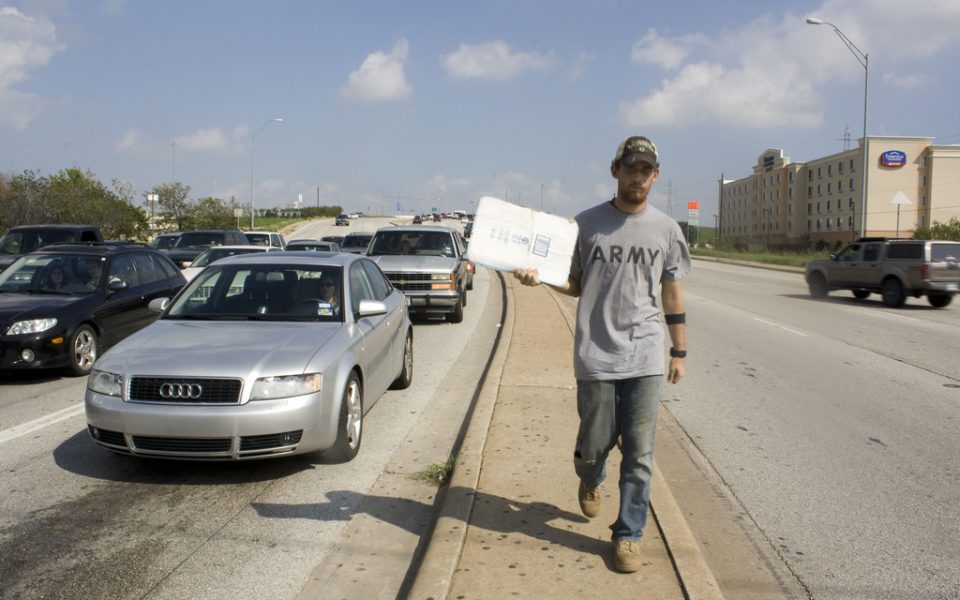When the “Chicken Lady” speaks on the topic of panhandlers, her word on the matter of panhandlers inevitably carries forth, instigating a small ripple of media stories, op-eds and Facebook debates.
Amy Murphy’s commitment to helping people experiencing homelessness is unassailable. She earned the nickname “Chicken Lady,” after all, from her weekly practice of serving leftover fried chicken donated by local restaurants to hungry people at Greensboro’s Center City Park. This makes her the perfect spokesperson for downtown gentrification: Given her record of personal hospitality, Murphy’s advocacy for policies that are hostile to the poor gives cover to people whose only concern is making downtown more comfortable for the wealthy and protecting investments in housing, restaurants and entertainment that cater to the super-rich.
First, it was Murphy’s proposal last September that homeless services be moved out of downtown. Then, on Feb. 5, Murphy posted on Facebook that Greensboro should emulate a program in Charlotte that encourages people to turn down requests for money from panhandlers.
Personally, I don’t often give money to panhandlers for a variety of reasons, and everyone is certainly within their rights to refrain from giving. But the idea of a marketing campaign to urge public stinginess strikes me as paternalistic. I wouldn’t presume to possess the omniscience to determine whether someone’s donation is going to help another person get on their feet or enable their bad decisions. And if it’s the latter, well, I could use a good, strong drink myself once in a while.
To Marcus Hyde, the debate about whether people should give money to panhandlers is just another way to shift the conversation from the structural causes of homelessness — lack of affordable housing, not enough living-wage jobs, poor healthcare — onto homeless people and their individual choices. As if all it took for homelessness to go away was for homeless people to shape up.
“Homeless people are just people,” Hyde told me. “They make good decisions and bad decisions. The difference is I can do whatever I want behind closed doors. That’s just code word for, ‘Certain types of people make me uncomfortable.’ To me, it sounds like the same crap as, ‘certain people choose to be homeless.’”
Hyde, who moved to Greensboro from Denver last summer so his wife could attend grad school at UNCG, was formerly homeless himself. He shared his story with some reservations because he doesn’t want people to extrapolate that his personal circumstances explain the entirety of why people become homeless.
“My dad hit me and at some point I said, ‘F*** you,’ and walked out the door,” Hyde recalled. “Eventually, I got a job and became a carpenter. I met some old ladies who were offering hospitality, and I carried some boxes for them. I found that most people who provide services are afraid to do advocacy. So, I started an organization with other people who experienced homelessness to work on issues that affect them based on their own priorities. What’s the saying? If you’re not at the table, you’re on the menu.”
Through his work with Denver Homeless Out Loud, Hyde found that two primary concerns emerged for people experiencing homelessness: Housing and the criminalization of homelessness.
In some ways it’s not surprising that campaigns to discourage people from giving money to panhandlers are gaining traction; efforts by cities to limit panhandling through regulation are increasingly running into trouble with the courts.
As Hyde wrote recently to members of Greensboro City Council, the city’s ordinances on panhandling — which among other things involve a licensing requirement, along with prohibitions against begging from traffic medians and asking for money within a certain distance of ATMs — risk running afoul of the Constitution’s free speech protections. In 2015, the US Supreme Court invalidated an earlier ruling upholding an anti-panhandling ordinance in Worcester, Mass., and a federal judge found that the city’s entire ordinance, including prohibitions on begging in traffic medians and near ATMs, was unconstitutional.
And in June 2017, a federal judge ruled that it’s unconstitutional for the city of Slidell, La. to require panhandlers to obtain a permit before begging for money.
In 2012, Greensboro City Council amended its ordinances to ban begging from traffic medians out of a professed concern for the safety of panhandlers and motorists. Three years later, a woman died because her right to ask for help was criminalized. Ellin Schott was arrested and hauled to jail by a Greensboro police officer for multiple occurrences of panhandling without a license while standing in a traffic median. She died a couple days later after being denied access to her anti-seizure medication.
The harbinger of doom for panhandling ordinances in Greensboro and other cities may well turn out to the be the Supreme Court’s unanimous ruling in Reed v. Town of Gilbert. While Reed addressed the right of a fledgling church to advertise its services in various rented facilities, the ruling could have profound implications for content-based restrictions on speech. As Judge Lance M. Africk wrote in Blitch v. City of Slidell, Reed “worked a sea change in First Amendment law.”
“Under strict scrutiny, the panhandling permitting requirement ‘can stand only’ if Slidell can prove the scheme ‘furthers a compelling interest and is narrowly tailored to achieve that interest,’” Africk wrote.
Unfortunately for Slidell, cracking down on panhandlers didn’t further a compelling interest, and the ordinance didn’t stand.
Join the First Amendment Society, a membership that goes directly to funding TCB‘s newsroom.
We believe that reporting can save the world.
The TCB First Amendment Society recognizes the vital role of a free, unfettered press with a bundling of local experiences designed to build community, and unique engagements with our newsroom that will help you understand, and shape, local journalism’s critical role in uplifting the people in our cities.
All revenue goes directly into the newsroom as reporters’ salaries and freelance commissions.


Leave a Reply